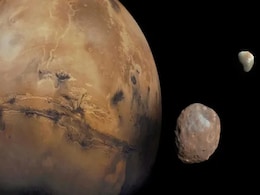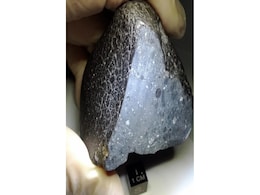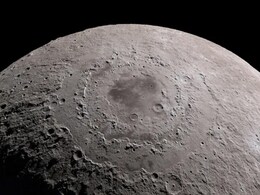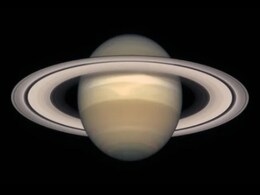Other Solar Systems
- All
- News
- Videos
-

Most Promising "Hints" Of Potential Life Detected On Distant Planet
- Thursday April 17, 2025
- World News | Agence France-Presse
Astronomers announced Thursday that they had detected the most promising "hints" of potential life on a planet beyond our solar system, though other scientists expressed skepticism.
-
 www.ndtv.com
www.ndtv.com
-

NASA Study Finds Solar Wind Could Be Key to Water Formation on the Moon
- Wednesday April 16, 2025
- Written by Gadgets 360 Staff
A recent study indicates that water on the lunar surface may come from the solar wind. The results suggest that other airless bodies in the solar system may also have water on their surfaces, therefore highlighting the possibility of finding such water on the surface of other such objects.
-
 www.gadgets360.com
www.gadgets360.com
-

First Future Type 1a Supernova Detected: White Dwarf Pair to Collide in 23 Billion Years
- Tuesday April 8, 2025
- Written by Gadgets 360 Staff
Astronomers have discovered a pair of white dwarf stars located about 150 light-years from Earth that are on course to collide and produce a Type 1a supernova in approximately 23 billion years. This is the first such system identified near our region of the galaxy. With a combined mass of 1.56 solar masses, the stars are slowly spiralling toward ea...
-
 www.gadgets360.com
www.gadgets360.com
-

Researchers Propose New Methods to Spot Atom-Sized Primordial Black Holes Moving Across Solar System
- Thursday November 28, 2024
- Written by Gadgets 360 Staff
Recent studies suggest that microscopic primordial black holes may exist within the solar system, potentially impacting planetary orbits and satellite movements. These small, early-universe black holes could also contribute to the mystery of dark matter, which makes up 85% of the universe's mass. Methods are being developed to detect their gravitat...
-
 www.gadgets360.com
www.gadgets360.com
-

Super-Earth In the Solar System Could Have Rendered Our Planet Uninhabitable, Says Study
- Wednesday November 27, 2024
- Written by Gadgets 360 Staff
A recent study explores a hypothetical super-Earth between Mars and Jupiter, revealing its severe impact on Earth's orbit and climate. Conducted by Florida Institute of Technology scientists Emily Simpson and Howard Chen, the simulation demonstrates how such a planet’s gravity could destabilise neighbouring planets, causing erratic orbits and ext...
-
 www.gadgets360.com
www.gadgets360.com
-

Mars' Moons Might Have Been Created From Asteroids Coming Too Close to the Red Planet
- Wednesday November 27, 2024
- Written by Gadgets 360 Staff
A study published in Icarus explores the possibility that Mars’ moons, Phobos and Deimos, formed from asteroid debris torn apart by the planet’s gravitational forces. Researchers ran advanced simulations to propose this scenario, which fits the moons’ circular orbits better than previous theories. Japan’s upcoming MMX mission is expected to...
-
 www.gadgets360.com
www.gadgets360.com
-

Evidence of Hot Water on Mars Found in Ancient Meteorite From Early Days of Solar System
- Monday November 25, 2024
- Written by Gadgets 360 Staff
Evidence of ancient hot water activity on Mars has been found in a 4.45-billion-year-old zircon grain from the NWA7034 meteorite. The findings, detailed in Science Advances, reveal that hydrothermal systems were active on Mars during the Pre-Noachian period. Researchers suggest these systems, essential for life on Earth, could have made Mars habita...
-
 www.gadgets360.com
www.gadgets360.com
-

New Lunar Map Attempts to Identify the Origin Impact Craters of Rock Samples
- Tuesday November 26, 2024
- Written by Gadgets 360 Staff
A new map of the moon’s Mare Orientale basin highlights areas containing original impact melt. These findings could help date the basin’s formation, which is estimated to be 3.8 billion years old. Scientists believe this research may reveal Earth’s early impact history while guiding future lunar sample-return missions. The map also distinguis...
-
 www.gadgets360.com
www.gadgets360.com
-

Chinese Rover Discovers Evidence Of 3.42 Billion Years Old Ocean On Mars
- Thursday November 7, 2024
- World News | Reuters
Like Earth and our solar system's other planets, Mars formed about 4.5 billion years ago. At the time the ocean apparently existed, it might already have begun its transition away from being a hospitable planet.
-
 www.ndtv.com
www.ndtv.com
-

Powerful Solar Storm Might Have Caused Widespread Auroras and Potential Disruptions, NOAA Says
- Monday October 14, 2024
- Written by Gadgets 360 Staff
A powerful G4-class solar storm, triggered by a coronal mass ejection from the sun, is causing breathtaking auroras in unusual regions. This geomagnetic event may disrupt power grids and communication systems while providing the chance for spectacular light displays across the northern half of the United States. The National Oceanic and Atmospheric...
-
 www.gadgets360.com
www.gadgets360.com
-

NASA Hubble Space Telescope Finds a High Number of Black Holes in the Early Universe
- Saturday September 21, 2024
- Written by Gadgets 360 Staff
An international team of researchers, led by scientists from Stockholm University's Department of Astronomy, has discovered a higher number of black holes in the early universe than was previously recorded. Using the NASA Hubble Space Telescope, this team found black holes among faint galaxies formed shortly after the Big Bang event.
-
 www.gadgets360.com
www.gadgets360.com
-

New Group of Distant Objects Suggests Our Solar System May Have a Second Kuiper Belt
- Saturday September 21, 2024
- Written by Gadgets 360 Staff
Astronomers have discovered 11 objects beyond the Kuiper Belt, suggesting the existence of a second belt, dubbed "Kuiper Belt 2." Located between 70 and 90 AU from the sun, this new region could redefine our understanding of the solar system's size and structure. The discovery was made using the Subaru telescope in collaboration with NASA’s New H...
-
 www.gadgets360.com
www.gadgets360.com
-

Mars’ Orbit Wobble Could Hint at the Presence of Dark Matter Emitting from Primordial Black Holes
- Wednesday September 18, 2024
- Written by Gadgets 360 Staff
MIT physicists have proposed that Mars' orbit might wobble due to the presence of primordial black holes, which could be a major source of dark matter in the universe. This theory builds on the idea that such black holes, formed just after the Big Bang, pass through our solar system and cause a gravitational effect detectable by current technology....
-
 www.gadgets360.com
www.gadgets360.com
-

Ancient Black Holes Might Be Passing Through Our Solar System Frequently, Study Claims
- Wednesday September 18, 2024
- Written by Gadgets 360 Staff
Primordial black holes, which may have formed shortly after the Big Bang, could pass through the solar system once per decade. These black holes are much lighter and smaller than typical black holes, yet their gravitational effects may help scientists uncover the mystery of dark matter. Detecting gravitational disruptions from these flybys might be...
-
 www.gadgets360.com
www.gadgets360.com
-

Saturn Rings Will Disappear Next Year in a Rare Celestial Event
- Thursday September 5, 2024
- Written by Gadgets 360 Staff
Saturn's rings, one of the most unique features of our solar system, are set to become nearly invisible in March 2025. This rare phenomenon will occur due to Saturn's unique axial tilt, which will align the rings edge-on with Earth's line of sight. The result is a brief period where these majestic rings will be almost unobservable from our planet. ...
-
 www.gadgets360.com
www.gadgets360.com
-

Most Promising "Hints" Of Potential Life Detected On Distant Planet
- Thursday April 17, 2025
- World News | Agence France-Presse
Astronomers announced Thursday that they had detected the most promising "hints" of potential life on a planet beyond our solar system, though other scientists expressed skepticism.
-
 www.ndtv.com
www.ndtv.com
-

NASA Study Finds Solar Wind Could Be Key to Water Formation on the Moon
- Wednesday April 16, 2025
- Written by Gadgets 360 Staff
A recent study indicates that water on the lunar surface may come from the solar wind. The results suggest that other airless bodies in the solar system may also have water on their surfaces, therefore highlighting the possibility of finding such water on the surface of other such objects.
-
 www.gadgets360.com
www.gadgets360.com
-

First Future Type 1a Supernova Detected: White Dwarf Pair to Collide in 23 Billion Years
- Tuesday April 8, 2025
- Written by Gadgets 360 Staff
Astronomers have discovered a pair of white dwarf stars located about 150 light-years from Earth that are on course to collide and produce a Type 1a supernova in approximately 23 billion years. This is the first such system identified near our region of the galaxy. With a combined mass of 1.56 solar masses, the stars are slowly spiralling toward ea...
-
 www.gadgets360.com
www.gadgets360.com
-

Researchers Propose New Methods to Spot Atom-Sized Primordial Black Holes Moving Across Solar System
- Thursday November 28, 2024
- Written by Gadgets 360 Staff
Recent studies suggest that microscopic primordial black holes may exist within the solar system, potentially impacting planetary orbits and satellite movements. These small, early-universe black holes could also contribute to the mystery of dark matter, which makes up 85% of the universe's mass. Methods are being developed to detect their gravitat...
-
 www.gadgets360.com
www.gadgets360.com
-

Super-Earth In the Solar System Could Have Rendered Our Planet Uninhabitable, Says Study
- Wednesday November 27, 2024
- Written by Gadgets 360 Staff
A recent study explores a hypothetical super-Earth between Mars and Jupiter, revealing its severe impact on Earth's orbit and climate. Conducted by Florida Institute of Technology scientists Emily Simpson and Howard Chen, the simulation demonstrates how such a planet’s gravity could destabilise neighbouring planets, causing erratic orbits and ext...
-
 www.gadgets360.com
www.gadgets360.com
-

Mars' Moons Might Have Been Created From Asteroids Coming Too Close to the Red Planet
- Wednesday November 27, 2024
- Written by Gadgets 360 Staff
A study published in Icarus explores the possibility that Mars’ moons, Phobos and Deimos, formed from asteroid debris torn apart by the planet’s gravitational forces. Researchers ran advanced simulations to propose this scenario, which fits the moons’ circular orbits better than previous theories. Japan’s upcoming MMX mission is expected to...
-
 www.gadgets360.com
www.gadgets360.com
-

Evidence of Hot Water on Mars Found in Ancient Meteorite From Early Days of Solar System
- Monday November 25, 2024
- Written by Gadgets 360 Staff
Evidence of ancient hot water activity on Mars has been found in a 4.45-billion-year-old zircon grain from the NWA7034 meteorite. The findings, detailed in Science Advances, reveal that hydrothermal systems were active on Mars during the Pre-Noachian period. Researchers suggest these systems, essential for life on Earth, could have made Mars habita...
-
 www.gadgets360.com
www.gadgets360.com
-

New Lunar Map Attempts to Identify the Origin Impact Craters of Rock Samples
- Tuesday November 26, 2024
- Written by Gadgets 360 Staff
A new map of the moon’s Mare Orientale basin highlights areas containing original impact melt. These findings could help date the basin’s formation, which is estimated to be 3.8 billion years old. Scientists believe this research may reveal Earth’s early impact history while guiding future lunar sample-return missions. The map also distinguis...
-
 www.gadgets360.com
www.gadgets360.com
-

Chinese Rover Discovers Evidence Of 3.42 Billion Years Old Ocean On Mars
- Thursday November 7, 2024
- World News | Reuters
Like Earth and our solar system's other planets, Mars formed about 4.5 billion years ago. At the time the ocean apparently existed, it might already have begun its transition away from being a hospitable planet.
-
 www.ndtv.com
www.ndtv.com
-

Powerful Solar Storm Might Have Caused Widespread Auroras and Potential Disruptions, NOAA Says
- Monday October 14, 2024
- Written by Gadgets 360 Staff
A powerful G4-class solar storm, triggered by a coronal mass ejection from the sun, is causing breathtaking auroras in unusual regions. This geomagnetic event may disrupt power grids and communication systems while providing the chance for spectacular light displays across the northern half of the United States. The National Oceanic and Atmospheric...
-
 www.gadgets360.com
www.gadgets360.com
-

NASA Hubble Space Telescope Finds a High Number of Black Holes in the Early Universe
- Saturday September 21, 2024
- Written by Gadgets 360 Staff
An international team of researchers, led by scientists from Stockholm University's Department of Astronomy, has discovered a higher number of black holes in the early universe than was previously recorded. Using the NASA Hubble Space Telescope, this team found black holes among faint galaxies formed shortly after the Big Bang event.
-
 www.gadgets360.com
www.gadgets360.com
-

New Group of Distant Objects Suggests Our Solar System May Have a Second Kuiper Belt
- Saturday September 21, 2024
- Written by Gadgets 360 Staff
Astronomers have discovered 11 objects beyond the Kuiper Belt, suggesting the existence of a second belt, dubbed "Kuiper Belt 2." Located between 70 and 90 AU from the sun, this new region could redefine our understanding of the solar system's size and structure. The discovery was made using the Subaru telescope in collaboration with NASA’s New H...
-
 www.gadgets360.com
www.gadgets360.com
-

Mars’ Orbit Wobble Could Hint at the Presence of Dark Matter Emitting from Primordial Black Holes
- Wednesday September 18, 2024
- Written by Gadgets 360 Staff
MIT physicists have proposed that Mars' orbit might wobble due to the presence of primordial black holes, which could be a major source of dark matter in the universe. This theory builds on the idea that such black holes, formed just after the Big Bang, pass through our solar system and cause a gravitational effect detectable by current technology....
-
 www.gadgets360.com
www.gadgets360.com
-

Ancient Black Holes Might Be Passing Through Our Solar System Frequently, Study Claims
- Wednesday September 18, 2024
- Written by Gadgets 360 Staff
Primordial black holes, which may have formed shortly after the Big Bang, could pass through the solar system once per decade. These black holes are much lighter and smaller than typical black holes, yet their gravitational effects may help scientists uncover the mystery of dark matter. Detecting gravitational disruptions from these flybys might be...
-
 www.gadgets360.com
www.gadgets360.com
-

Saturn Rings Will Disappear Next Year in a Rare Celestial Event
- Thursday September 5, 2024
- Written by Gadgets 360 Staff
Saturn's rings, one of the most unique features of our solar system, are set to become nearly invisible in March 2025. This rare phenomenon will occur due to Saturn's unique axial tilt, which will align the rings edge-on with Earth's line of sight. The result is a brief period where these majestic rings will be almost unobservable from our planet. ...
-
 www.gadgets360.com
www.gadgets360.com

















